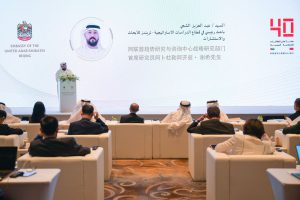ABU DHABI/WAM
TRENDS Research & Advisory has participated in the first UAE-China Think Tanks Forum in Beijing, organised by the UAE Embassy in China.
The Centre expressed its appreciation for this initiative, which reflects the growing recognition of think tanks in today’s world and highlights the deep historical, cultural, and economic ties between the UAE and China.
During his speech at the forum, Abdulaziz Al-Shehhi, senior researcher at TRENDS, emphasised that the event is an important platform for exchanging ideas and visions about the shared future between the two countries, especially amid the rapidly changing global landscape.
He pointed out the critical role of think tanks in fostering dialogue and understanding between nations and peoples and shaping the future. Al-Shehhi underlined TRENDS’ commitment to collaborating with Chinese research centres, asserting that such cooperation contributes to a prosperous future for all.
Therefore, TRENDS has established its office in Beijing to enhance academic and research collaboration and support researchers and scholars interested in Arab-Chinese relations in general and UAE-China relations in particular.
Represented by researcher Al-Shehhi, TRENDS also participated in a panel discussion titled “Trade and Economic Recovery,” organised by the UAE Embassy in collaboration with the China Institute of International Studies (CIIS). During the discussion, he noted that the Chinese economy is experiencing a gradual recovery despite the challenges it faces, highlighting significant rebounds in the industrial and service sectors.
Al-Shehhi stressed that the recovery of the Chinese economy is not just an internal matter but of global importance. China is the leading trade partner for many countries and the primary driver of global economic growth.
On the other hand, researcher Shamma Ahmed Al Qutba participated in a second panel discussion titled “Education, Culture and Tourism”.
She mentioned that to connect the new generation with heritage; digital platforms can be used to create unique cultural experiences that blend modern technology with traditional content from both the UAE and China, including creating virtual exhibitions that allow young people to visit museums and heritage sites using virtual reality (VR) technology, thereby enhancing their awareness and enriching their understanding of different cultures.
The researcher from TRENDS also suggested organising interactive online workshops to teach traditional crafts, such as Arabic calligraphy or Chinese painting, so that young people can learn about ancient manual skills and their cultural values.
She stated that the shared cultural heritage between the UAE and China can be enhanced through the production of digital content that helps connect the new generation with the history and culture of both countries.
 The Gulf Time Newspaper One of the finest business newspapers in the UAE brought to you by our professional writers and editors.
The Gulf Time Newspaper One of the finest business newspapers in the UAE brought to you by our professional writers and editors.
